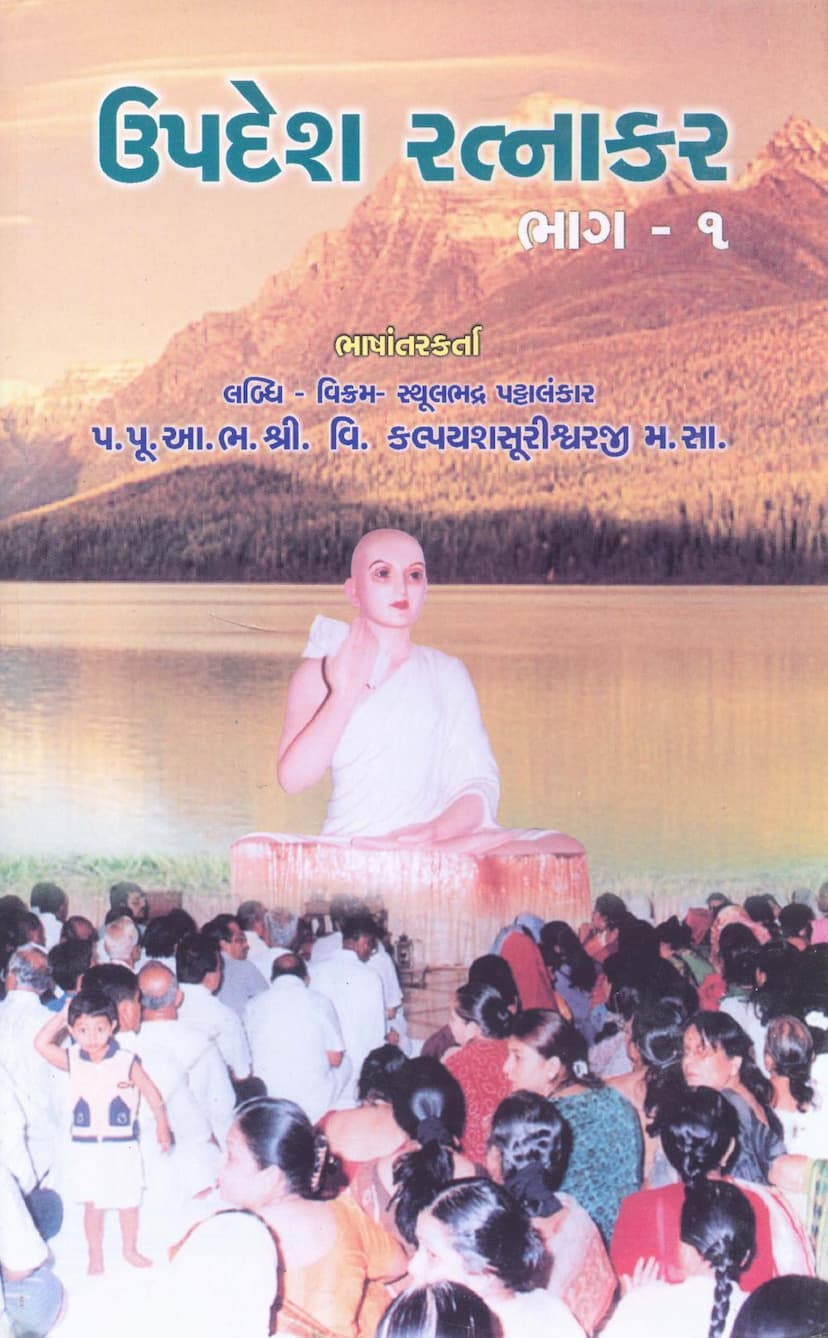Updesh Ratnakar Part 01
Added to library: September 2, 2025

Summary
Here's a comprehensive summary of the Jain text "Updesh Ratnakar Part 01" by Kalpyashsuri, based on the provided text:
Overall Theme and Purpose:
"Updesh Ratnakar Part 01" (Advice Jewel) is a Jain text authored by Acharya Munisundarsuri and translated into Gujarati by Pu. Aa. Bha. Shri Vijay Kalpyashsuri Shrimad Sayad. The book is a collection of profound spiritual and ethical teachings aimed at guiding individuals towards righteousness, self-improvement, and ultimately, liberation (moksha). It emphasizes the importance of right conduct, knowledge, and devotion within the framework of Jain philosophy.
Key Components and Content:
The text is structured as a compendium of guidance, drawing from various philosophical schools of thought within Jainism, particularly referencing Dravyānuyoga, Charaṇkaraṇāquyoga, and Kathānuyoga. The author, Acharya Munisundarsuri, is presented as a highly learned and influential spiritual leader, renowned for his vast knowledge, sharp intellect, and ability to explain complex concepts with clarity and depth.
The Translator and the Occasion:
The translation into Gujarati is attributed to Pu. Aa. Bha. Shri Vijay Kalpyashsuri Shrimad Sayad, whose efforts are lauded for making this profound text accessible to a wider audience. The publication is dedicated to the spiritual lineage and the auspicious occasion of the 100th anniversary of Acharya Vijay Ratnasurisurishwarji Maharaj Sahib's renunciation and the 50th anniversary of Acharya Vijay Sthulbhadrasurishwarji Maharaj Sahib's renunciation.
Content Highlights:
- Author's Expertise: Acharya Munisundarsuri is highlighted as a "Sahasravadhani" (one who can remember a thousand things), possessing remarkable memory and the ability to grasp intricate details of various subjects, including music and philosophy. His mastery over Sanskrit and Prakrit languages is also emphasized.
- Multifaceted Teachings: The book covers a wide range of topics, including:
- Spiritual and Ethical Principles: The core of the teachings revolves around living a virtuous life, emphasizing principles like non-violence (ahimsa), truthfulness (satya), non-possession (aparigraha), celibacy (brahmacharya), and forgiveness (kshama).
- Moral Instruction: Numerous illustrative stories and examples are used to convey moral lessons about karma, dharma, the consequences of one's actions, and the importance of controlling desires and negative emotions.
- Philosophical Insights: The text delves into Jain philosophical concepts, explaining the importance of right faith (samyak darshan), right knowledge (samyak jnan), and right conduct (samyak charitra).
- Practical Guidance: It offers practical advice for daily life, covering aspects like the conduct of monks and laypeople, the importance of a guru, the nature of virtue and vice, and the path to spiritual liberation.
- Analogies and Examples: The text uses a rich tapestry of analogies and stories, drawing from various sources, to illustrate its points. These include examples from the lives of kings, sages, common people, and even animals, demonstrating the universal applicability of the teachings.
- The Nature of Righteousness: The text stresses that true righteousness is not merely external rituals but an internal transformation of one's character, thoughts, and actions. It highlights the importance of sincerity, devotion, and constant self-reflection.
- Structure and Organization: The text appears to be organized into various sections or "tarangs" (waves), each focusing on specific aspects of spiritual guidance, often using illustrative stories. The table of contents (Anukramanika) indicates a methodical approach to covering a vast array of subjects.
- Emphasis on Swadhyay (Self-Study): The importance of studying and reflecting on the teachings of the scriptures (swadhyay) is repeatedly emphasized as a path to spiritual growth and overcoming spiritual obstacles.
- Devotion and Reverence: The text begins with prayers and salutations to revered Jain figures like Lord Shankheshwar Parshvanath and Gautam Swami, signifying the devotional aspect of the teachings.
- Timeless Wisdom: The teachings are presented as timeless wisdom, applicable to all individuals seeking spiritual upliftment and a meaningful life.
Significance of the Translation:
The Gujarati translation by Shri Kalpyashsuri is crucial for making the wisdom of Acharya Munisundarsuri accessible to those who may not have access to the original texts. This act of translation is seen as a service to the Jain community and a means of spreading spiritual knowledge.
Overall Impression:
"Updesh Ratnakar Part 01" is presented as a valuable spiritual guide that imparts wisdom on ethical living, moral conduct, and the path to spiritual enlightenment within the Jain tradition. It reflects the author's profound understanding of Jain philosophy and the translator's dedication to disseminating this knowledge. The book is a testament to the rich literary and spiritual heritage of Jainism.